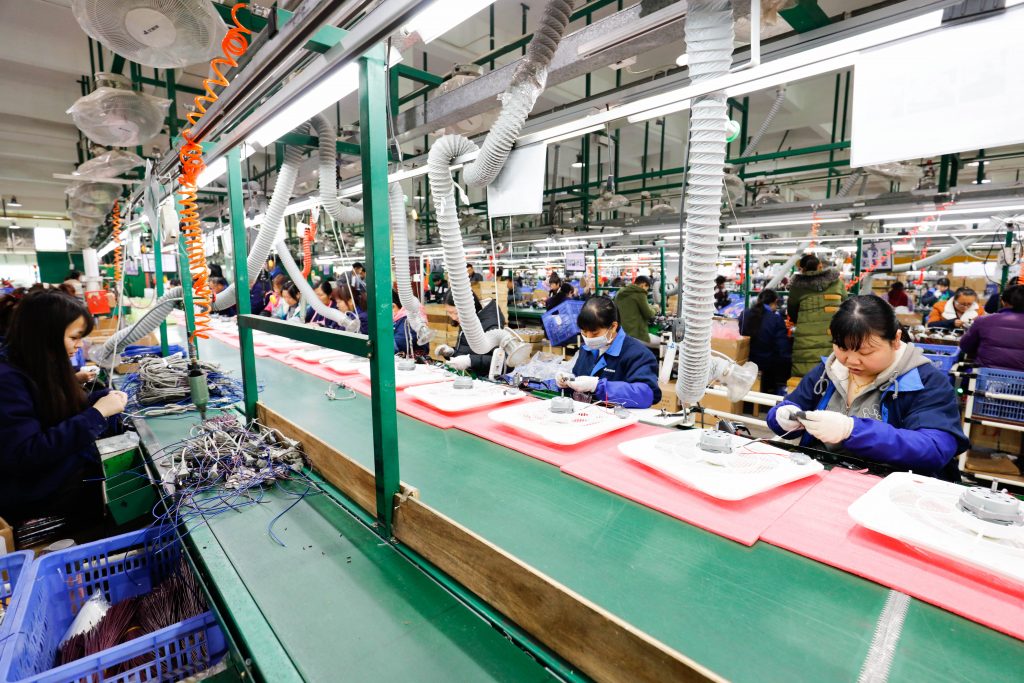
Stories of slavery-like conditions in Malaysian factories have been well-known for years. While the country’s new government is slowly taking partial steps to address abuse of foreign workers, politicians and civil society are calling for international buyers to act.
Mortensen / @DanWatchDK
Kuala Lumpur seems to be in a neverending building boom. Everywhere you look, cranes are working to expand the wide range of shiny skyscrapers on the city’s already overwhelming skyline – all flashing the country’s long-standing growth rates and billions of dollars, yuan, euros and swiss francs in foreign investments.
Yet typically, it is not Malaysian citizens that are dangling in scaffoldings high above the streets of the capital to finish the prestigious towers. Often it is rather some of the country’s millions of migrant workers.
Estimated to count 4-6 million workers from Bangladesh, Nepal, Myanmar and Indonesia are employed as construction workers, security guards, domestic workers and factory workers in the manufacturing sector. Migrant workers are also playing a vital part in the Malaysia’s main economic driver: its electronics industry.
VIRTUALLY EVERY DEVICE ON THE MARKET
Malaysia is one of the world’s leading exporters of information and communication technology (ICT) with electronics accounting for almost 40 percent of the country’s total exports in 2018 according to Malaysia’s government trade promotion agency, MATRADE.
Most of the internationally best-selling electronic brands are in one way or the other sourcing from Malaysia. The semiconductor, also known as the integrated circuit or the computer chip, is Malaysia’s greatest export specialty. It sits inside pretty much all electronic equipment being produced today, from your mobile phone to burglar alarms, and so “virtually every device on the market” can have components that have passed through the country, as the American supply chain watchdog Verité phrased it in a study from 2015.
Following several economic strategies to attract electronic firms from Japan and the US, foreign direct investments in Malaysia grew dramatically in the 1980’s, resulting in a booming electronics industry which upheld a massive growth in the years that followed.
Since the investments focused on the low-cost, labor-intensive manufacturing sector, this created a huge demand for cheap labor. The issue was addressed by recruiting foreign workers, and ever since, the import of labour only proliferated.
“In this country we are addicted to cheap labour. We are addicted to migrant workers”, as
Charles Santiago, a Malaysian MP and former human and labour rights activist, puts it.
Joseph Paul Maliamauv, director of the Malaysian workers’ rights organization Tenaganita, phrases it more somberly:
“Our country has grown physically, infrastructure-wise, based on the sweat, the blood and the broken bones of migrant workers.”
THE QATAR OF SOUTHEAST ASIA
Taking a look at the statistics, Malaysia is in some ways comparable to the more often-told stories about conditions for migrant workers in the Arab states of the Persian Gulf.
According to the 2014 Verité study, out of a sample of more than 400 electronics workers in Malaysia, at least 32 percent of migrants were forced to work against their will because of such things as debt bondage. And that is a conservative estimate based on a rather strict definition of forced labour.
According to the study, 73 percent of electronics workers demonstrated forced labor features of some kind. 94 percent said their employer or labour agent held their passport and 71 percent reported that it was impossible or difficult to get their passports back on request.
EXPLOITATION AT EVERY LEVEL
Foreign workers generally travel to Malaysia with high hopes. As the workers that Danwatch has interviewed testify, recruitment agents often tell migrants about wages and living conditions that are quite different from what they come to experience in Malaysia.
“If you analyse the labour supply chain from the worker’s country of origin to Malaysia and when the worker return, there is exploitation at every level”, says Adrian Pereira, Executive Director of the North South Initiative, an organization that provides support for foreign workers in Malaysia and their origin countries.
“Everyone wants to make a quick buck of the migrant workers. So it is not just during work, it is after work, before work, it is the journey coming to the country, it is the journey returning home. And even the detention centers in Malaysia are making money from this whole labour exploitation”, Pereira says.
According to the Verité study, 92 percent of migrant workers paid recruitment fees to get the job in Malaysia, and often the charges can take months or even years of work to pay off. When coming to Malaysia, additional charges for visas or a work permit may be added to that, and as wages are lower than what was originally promised, most workers are happy to take as much overtime as possible.
MIXED SIGNALS
For years, it has been a political objective to limit the share of migrants in the Malaysian labor force. The previous government introduced foreign worker levies on employers to discourage them from hiring migrants, but according to the International Labour Organisation ILO many employers just deducted these costs from the workers wages – until the levy charges, officially at least, were shifted back to employers in 2018.
Malaysia’s new government, which came to power in 2018, overturning a 61-year rule of the same political party, has made promises to improve conditions for foreign workers. Among other things, it has been targeting middlemen and recruitment firms and striking deals with origin countries to directly recruit workers from there.
However, the government has also sent somewhat mixed signals on these issues. For example, when recent investigations by the Guardian and ABC revealed what seemed to be forced labour, forced overtime and debt bondage at Malaysian glove factories, the Human Resources Minister M. Kulasegaran initially denied all allegations, saying that the glove producers had done nothing wrong.
SHOULD RECONSIDER THE WHOLE ECONOMY
Labour advocates criticise Malaysian authorities for rarely penalising employers while rather putting the blame on undocumented migrant workers. They point to how workers are basically prevented from taking legal action against employers, since the migrants must remain in Malaysia during a trial but are simultaneously banned from working in the country as soon as they press charges and thus cannot have any kind of income while the case proceeds.
“We do see changes in terms of the government wanting to break with the outsource licenses and them wanting to revamp the labor laws”, says Sumitha Shaanthinni, a Malaysian lawyer working with migrant cases.
“But then when you see the statements from the ministries; they are not really worker friendly. And so you seem to feel a déjà vu: that you are somehow dealing with the same type of government”, Shaanthinni adds.
Adrian Pereira of the North South Initiative claims that the government’s reform agenda is produced in “an anti-migrant manner” that “clearly blames migrant workers for low wages”.
“The main issue is that we are not ready to make a transition away from an overdependence on labor migration, but we are still continuing this harsh exploitation. So I think the whole economy needs to relook at its supply chain. Relook at its economic model”, Pereira says.
Danwatch has tried to get a comment from Malaysian officials on the concrete points of criticism concerning the migrant workers’ conditions and options for remedy but only managed to get a brief statement from the Deputy Secretary General of the Ministry of Human Resources, Amir bin Omar.
“We are currently taking stern action and are having regular inspections, not only in the electronic sector but all sectors of economic activities which hire foreign workers”, says the Deputy Secretary General who promises that his ministry will very soon present new policies targeting these issues.
OUTSOURCING CAUSES PROBLEMS
For many of the directly employed electronic workers in Malaysia, the situation may have improved over the past years.
Samsung. for example. has previously been accused of labour abuse in Malaysia, but when Danwatch talked to workers that were directly hired at a Samsung plant, they all said they had only paid a rather small recruitment fee, could freely access their passports, were satisfied with their accomodation and even held collective birthday events with presents from the factory.
However, a recent investigation by the Guardian revealed that though conditions had improved for the directly hired workers, the many outsourced contract workers that are working for Samsung experience some very different, abusive working and living conditions. Similarly, Danwatch especially identified grave examples of abuse amongst workers that were employed through an outsourcing agent at a factory owned by the German Possehl Group – and those workers said that the directly hired workers enjoyed much better conditions.
Over the years, foreign workers have increasingly signed contracts with labour contractors and not directly with the manufacturers. A study from 2019 by the ILO, OECD and the Asian Development Bank Institute concluded that the tendency pushes workers “into disadvantaged and vulnerable positions characterized by long hours, absence of social protection, and, in many cases, confiscation of their passports and other working papers.”

“THE LOWEST CATEGORY OF THE LABOURERS”
At the labour agency association PIKAP Malaysia, which represents 150 of such Malaysian labour agencies, President Fiona Low, emphasizes that Malaysian labour laws “are really, really strict”, and says that that foreign workers can always report abuse to the police, the labour ministry or their embassies.
Danwatch presents Low with some of the findings of labour abuse and debt bondage in Malaysia and points to how rights groups and several global brands suggest that an effective way to address the issues would be calling for zero recruitment fees to be paid by the migrants. But PIKAP’s president does not agree that employers should cover all recruitment fees.
“This is not so fair. Because zero costs are unhealthy. Some workers don’t have the commitment and a mindset that says that ‘I have to work better’, compared to zero costs and the costs to pay. So some workers will take advantage of this and abuse the facilities because they have nothing to lose.”
- But in general, people don’t pay to work at a company. You don’t pay anything to come and work for this company – the company offered you the job and you are still coming?
“You have to come in, and I don’t believe that 100 percent of the workers will come in.”
- But what is the difference between them and you?
“Because this is the labourer that we are talking about. Are you talking about the labourer? The lowest category of the labourers? You must look at the standard, in manner of education as well. They might not be able to understand and to commit themselves 100 percent to zero costs”, Low told Danwatch.
INTERNATIONAL BRANDS SHOULD ACT
As political improvements are stalling, both civil society and Malaysian politicians are calling on the international buyers to be held accountable for the violations taking place in the country’s electronic industry.
“You need to have an open and accountable process. And there must be an industry-wide regulation. Internal, but external as well. In order to assure that such slavery process does not occur in production of any modern goods”, Charles Santiago, the Malaysian MP and former human rights activist, tells Danwatch.
He is backed by Sumitha Shaanthinni, the Malaysian lawyer working with migrant cases:
“The international buyers need to go down their supply chain. It is not enough that you just go to the first level or the second level. There are people down below the supply chain that are doing more violations than the ones you are dealing with in the first tier”, she says.

